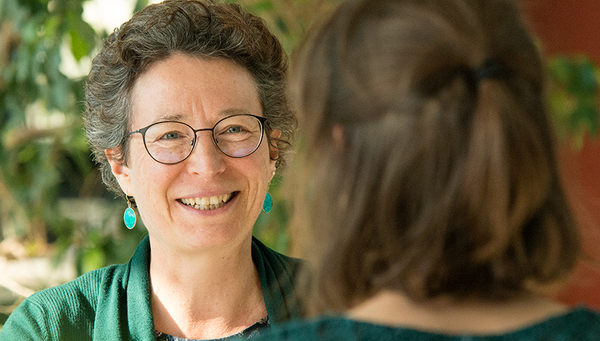News Detail
“With complex problems, decisions made from gut instinct can be quite wrong.”
March 6, 2019 |
Judit Leinert, you’re a specialist in good decision making. How can I decide on the perfect place to go on holiday this summer?
In my research group, we approach decision making with the help of “Multi-Criteria Decision Analysis”, or MCDA. This method allows you to arrive at the optimum solution to a problem to which there is no one perfect answer from the outset.
In the case of your holiday destination, we would first look at your needs and then assess how well numerous holiday options meet these needs. Then we would ascertain what areas you would feel most comfortable making compromises in. For instance, you might be happy to pay more in order to have a lower carbon footprint. Finally, I would bring all of your needs and considerations together in a mathematical model. So, just to give it a whirl, what is important to you in your choice of holiday?
Being in nature, not spending too much, environmental sustainability and experiencing something out of the ordinary.
Right. So now we’ll generate as many options as possible using plenty of imagination and find out how we can best satisfy your needs. What does a cycling holiday in Scandinavia cost, or trekking in Nepal? What’s the carbon footprint of an all-inclusive holiday on the Mediterranean or survival training in Toggenburg? Now I’ll ask you how important one requirement is to you in comparison to the others. If you rate cost as only half as important as a low carbon footprint, then the trip to Toggenburg will land first place. Now, you might have arrived at this solution even without MCDA, but we often experience surprises because we become more acutely aware of what is really important to us. And with very complex issues, particularly where a lot of people are involved, a gut feeling can often send us in the wrong direction.
What problems do you tackle in the research group with Multi-Criteria Decision Analysis?
So far, we’ve mainly been dealing with decisions in urban water management, where people are trying to achieve several – often conflicting – objectives such as “low costs” and “environmental sustainability”. The problem is, the most environmentally friendly solution may sometimes be the most expensive. What is more, many people are involved in the decision making process in contrast to your perfect holiday destination decision. A carefully conducted MCDA involves the various stakeholders in the decision making process, creates transparency and allows reasonable compromises to be worked out. This process increases acceptance for the subsequent decision among the politicians, associations and the population.
In rural, sparsely populated areas, centralised wastewater systems are often not used to capacity. The systems are ageing, and can be very costly to replace with new centralised systems. Eawag is helping to identify alternatives that are acceptable to the local populations.
(Photo: Daniel Guggisberg)
Can you give a specific example?
In one project that is being jointly funded by the canton of Solothurn, we are investigating how domestic wastewater can best be treated in future in rural, sparsely populated areas. Because wastewater treatment plants connected by sewerage systems in such areas are not used to full capacity in such places, they are expensive. Decentralised wastewater treatment plants could therefore offer a viable alternative to central system. Our research colleague Philipp Beutler has carried out a careful MCDA as part of a case study, and conducted interviews, on line questionnaires and workshops. For the most part, the results from the local population were quite unexpected: alongside the option to connect via sewage network to a neighbouring wastewater treatment plant, decentralised plants were also found to be a good alternative. Which direction the community will actually decide to take in the future will be thrashed out between the cantonal authority and the local population themselves.
We are also deploying the MCDA method in West Africa in a Horizon 2020 project funded by the EU, called FANFAR. The aim is to develop a reliable forecasting system for flooding events together with local stakeholders and experts from throughout West Africa.
Flooding in Lagos, Nigeria: floods are becoming an increasingly serious problem in West Africa, which is likely to worsen with climate change.
(Photo: peeterv / iStock)
How widespread is the use of MCDA outside of academia – in other words in environmental agencies, or in national and cantonal government?
Supporting decision making with the use of MCDA is still not very well established. However, cost-benefit analysis is widely used, for example in engineering firms. That’s basically a highly simplified form of MCDA. I do think though that we can achieve better results with a participative MCDA process. Firstly, important interest groups are represented right from the start of the decision making process. Secondly, heavily simplified models are sometimes so simple that they incorporate incorrect assumptions – which ultimately leads to false results.
A complex decision is always a unique thing. It has so far not been documented whether real, complex decisions are actually better off using MCDA. But stakeholders often confirm that thanks to MCDA they are better informed, they are more aware of their needs and they understand the needs of other stakeholders better. For me, a strong argument for MCDA is the transparency it provides in the context of larger environmental political issues and decisions affecting society.
What are the challenges in the area of decision analysis?
When objectives are oversimplified, systematic errors can creep in. We are developing methods to prevent this happening. We also want to involve the public more through online surveys, and we’re currently testing various survey options. Our PhD student Fridolin Haag has tested an online process for ascertaining objectives in urban water management, and our postdoc Alice Aubert is working meticulously to improve online questionnaires with the help of gaming elements.
Research in the field of “decision analysis” began in the 1960s in the USA and was primarily used by economists. Psychologists picked up on the ideas in the 1970s to examine human decision making behaviour. Nowadays, these theories are used in every conceivable field, such as in industry, medicine, and consumer and environmental decision making. Fundamentally, the approach to such problems is irrelevant, whether it’s about financial, political or environmental decisions, as they are all typically about large scale and complex issues.



